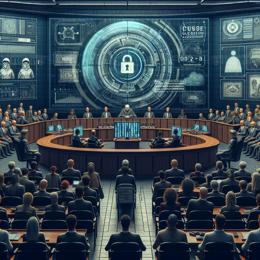Image created with AI
ICJ Upholds Responsibilities for Israel, Rejecting SA's Bid for Additional Measures in Gaza
In a pivotal ruling, the International Court of Justice (ICJ) has turned down the South African government’s plea for supplementary provisional measures against Israel regarding the ongoing conflict in the Gaza Strip, particularly in the southern city of Rafah. The court, however, underscored the binding nature of Israel’s commitments to uphold the safety and security of Palestinian civilians under the Genocide Convention.
This development follows South Africa’s pursuit for further international intervention, as it highlighted the intensification of military offensives in the densely populated region of Rafah, which houses a significant proportion of Gaza’s 1.4 million inhabitants. The ICJ previously ordered provisional measures on January 26, 2024, which the latest request from South Africa sought to expand based on newly unfolding military events.
Israeli Prime Minister Benjamin Netanyahu’s declaration to clear civilians from Rafah before a forceful military campaign added urgency to the situation. Despite this, the South African contention was that no safe space remained for the relocation of these civilians, rendering Israel's intended evacuations ineffective, according to South Africa's February 12 application to the ICJ.
The court's recent decision, announced this past Friday, resonated with the concerns expressed by United Nations Secretary-General Antonio Guterres, who depicted the escalation as exacerbating a "humanitarian nightmare with untold regional consequences."
While Israel objected to South Africa’s additional requests, indicating a commitment to civilian safety and claiming no significant change in the state of affairs since the January ruling, South Africa welcomed the ICJ’s reinforcement of existing orders. This affirmation from the court bolsters South Africa's stance that Israel must ensure the security of all individuals within the Gaza Strip, including Rafah.
President Ramaphosa's administration, through spokesperson Vincent Magwenya, acknowledged the decision, appreciating its support for immediate enactment of the established provisional measures. The government plans to sustain diplomatic efforts via the United Nations Security Council to reinforce the ICJ’s mandates.
Prominent ICJ litigator Francis Boyle sees the court’s recent judgment as a significant backing for South Africa. Although the court did not grant the additional measures, Boyle suggests that the court's recognition of the dire humanitarian implications could propel South Africa to seek further international support against non-compliance by Israel through the United Nations Security Council and potentially, the General Assembly.
As the conflict continues in Gaza, the international community watches closely, with South Africa at the forefront of advocating for the protection of human rights and adherence to international law amid the straining atmosphere.










